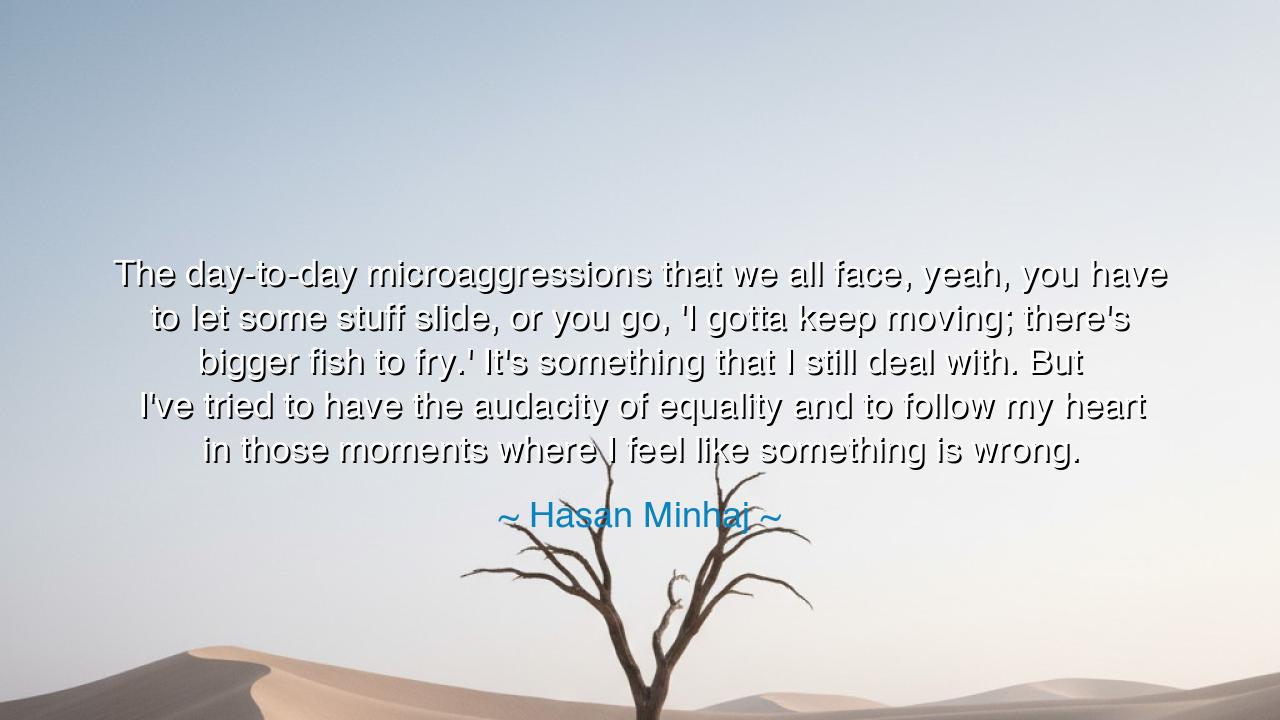
The day-to-day microaggressions that we all face, yeah, you have
The day-to-day microaggressions that we all face, yeah, you have to let some stuff slide, or you go, 'I gotta keep moving; there's bigger fish to fry.' It's something that I still deal with. But I've tried to have the audacity of equality and to follow my heart in those moments where I feel like something is wrong.






“The day-to-day microaggressions that we all face, yeah, you have to let some stuff slide, or you go, ‘I gotta keep moving; there’s bigger fish to fry.’ It’s something that I still deal with. But I’ve tried to have the audacity of equality and to follow my heart in those moments where I feel like something is wrong.” So speaks Hasan Minhaj, and in his words we hear not only the lament of the present age, but also the eternal call of the human struggle for dignity. For the road of life is littered with stones of insult, with slights both hidden and open, and it is the burden of the courageous to decide when to endure and when to rise.
The ancients knew well the weariness of the spirit that comes from countless small injuries. A single arrow may not bring down the warrior, but a thousand cuts can weaken even the strongest. Such are microaggressions: small in appearance, mighty in accumulation. Yet Minhaj reminds us of the wisdom of discernment—that one cannot fight every battle, lest the soul be consumed in endless strife. Sometimes, the noble act is to let the arrow pass, to keep the feet moving toward a higher purpose.
But he also speaks of a moment of fire, a time when silence is no longer the path of wisdom. Here enters what he calls the audacity of equality—that boldness to stand tall and say, “This is wrong.” It is an audacity because it challenges the invisible chains that society still dares to place upon the shoulders of the marginalized. To declare oneself equal, when centuries have whispered otherwise, is nothing short of rebellion. It is a courage that lights the darkness and forces the world to reckon with its shadows.
Consider the example of Rosa Parks, who one day chose not to let it slide. For many days and years, she endured the weight of day-to-day slights, the grinding machinery of segregation. But on that December day in Montgomery, she summoned the audacity of equality and refused to surrender her seat. Her act was small in outward form—merely sitting still—but immense in consequence. Like Minhaj’s teaching, it shows us that the heart must sometimes declare war on the ordinary indignities, for within them hides the larger battle for justice.
Yet this teaching is not only about the public square; it is also about the secret chambers of our own souls. Each of us knows the temptation to let wrongs fester, to either bury them in silence or to lash out in blind anger. Minhaj’s wisdom offers the middle way: discern when to conserve your strength, and discern when to let your heart guide you to speak. For not every fire must be fought, but neither must every injustice be endured. The noble life is lived in the tension between patience and courage.
What lesson, then, should we draw? It is this: cultivate both endurance and bravery. In your daily life, when a slight seeks to pierce your peace, weigh it. Ask yourself: will answering this advance justice, or will it scatter my energy away from the true struggle? But when silence would betray your dignity, let your words rise with strength. This balance is the art of the wise.
Practically, let each of us begin small. In the workplace, at school, in the marketplace—when a careless word wounds another, do not let it pass if your heart demands action. Speak with calmness but also with fire. And yet, know also when to let the wind carry away the dust, focusing instead on the larger stones that must be overturned. In this way, you preserve your strength for the battles that matter most, and your courage becomes both precise and powerful.
So let Minhaj’s words be carried as a torch: endure what must be endured, but in the moment of truth, have the audacity of equality. For the world changes not only through grand revolutions, but through countless small acts of courage, each born of the heart refusing to bow. And when you follow your heart in this way, you join the long procession of those who, across the ages, refused to let wrong stand unchallenged. This is the path of dignity, and it is the path of the free.






AAdministratorAdministrator
Welcome, honored guests. Please leave a comment, we will respond soon